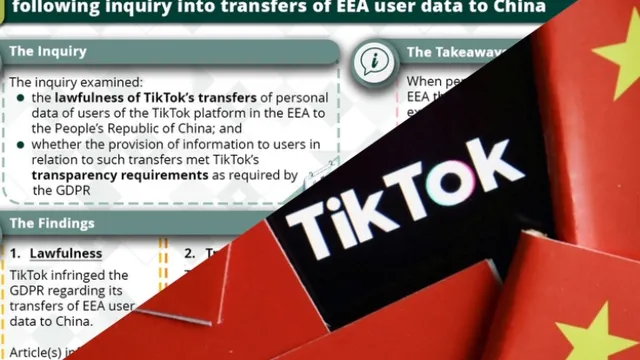
TikTok fined 530 million euros for transferring user data to China
2025-05-02 16:25- Ireland's Data Protection Commission fined TikTok 530 million euros after a four-year investigation.
- The investigation revealed that TikTok breached GDPR by transferring user data to China without adequate safeguards.
- Regulators ordered the company to comply with data privacy rules within six months, or face consequences.
Express your sentiment!
Insights
In Ireland, TikTok has faced significant regulatory challenges due to its data transfer practices regarding European user information. The Irish Data Protection Commission conducted a four-year investigation, ultimately concluding that TikTok infringed the General Data Protection Regulation (GDPR) by transferring user data to China without adequate safeguards. This investigation was sparked by growing concerns that TikTok's data handling could pose security risks, especially considering its parent company, ByteDance, is based in China, raising questions about compliance with EU data privacy standards. During the investigation, it was determined that TikTok had failed to confirm that the personal data of European Economic Area (EEA) users was protected to an equivalent standard as provided within the EU. The regulator, Graham Doyle, highlighted the deficiencies in TikTok's assessments concerning potential access by Chinese authorities to EEA personal data. Concerns about Chinese laws on anti-terrorism, counter-espionage, and data protection practices diverging from EU standards contributed to the decision. In response to these regulatory actions, the Irish watchdog has mandated TikTok to align its data processing operations with the EU regulations within a six-month timeframe. Failure to comply could lead to a suspension of data transfers to China. TikTok plans to appeal the fine, arguing that the investigation primarily focused on a specific period ending in May 2023 before it initiated Project Clover. Project Clover entails the establishment of three data centers in Europe aimed at enhancing data security and localization. Despite these developments, TikTok remains under scrutiny for its transparency regarding data policies. Previous privacy policies did not clearly disclose that user data could be accessed by personnel based in China, creating distrust with users and regulators alike. The Irish regulator's investigation has raised additional questions about TikTok’s overall data handling practices, emphasizing the need for compliance and thorough communication with users about data security measures.
Contexts
Data protection laws in the European Union (EU) play a crucial role in safeguarding individuals' privacy and personal information. The General Data Protection Regulation (GDPR), which came into effect in May 2018, is the cornerstone of data protection legislation in the EU. It establishes a framework for privacy rights that extends to all individuals within EU member states, regardless of their nationality or residency. The GDPR aims to protect personal data and privacy by imposing strict obligations on organizations that collect, store, and process personal information. This regulation not only enhances individuals' control over their data but also imposes substantial penalties on entities that fail to comply, making data protection a priority for businesses operating within the EU jurisdiction. One of the key principles of the GDPR is the necessity for explicit consent from individuals before their personal data can be processed. Organizations are required to clearly inform individuals about how their data will be used, and consent must be obtained through a transparent and straightforward process. Additionally, individuals have the right to access their data and request its deletion under certain circumstances, empowering them to take charge of their personal information. The regulation also introduces the concept of 'data portability,' allowing individuals to transfer their data between service providers seamlessly, further enhancing their control over personal data. The accountability principle embedded in the GDPR requires organizations to demonstrate compliance with its provisions actively. This includes implementing data protection policies, conducting regular audits, and appointing a data protection officer if necessary. Furthermore, any data breaches must be reported to the relevant authorities and affected individuals within a stringent time frame, ensuring that transparency and trust are maintained in data handling practices. The regulation's enforcement mechanisms include significant fines, which can reach up to 20 million euros or 4% of the organization's global annual turnover, whichever is higher. Such penalties underline the seriousness with which the EU approaches data protection. Beyond the GDPR, the EU is continuously working on enhancing data protection measures, including proposals for further legislation to address emerging challenges posed by technological advancements. The Digital Services Act (DSA) and the Digital Markets Act (DMA) are examples of initiatives aiming to ensure that digital services operate transparently and fairly, contributing to data protection at a broader level. As the landscape of data protection evolves, the EU aims to set a standard for the global community, emphasizing the importance of privacy rights and the protection of personal data in the digital age.